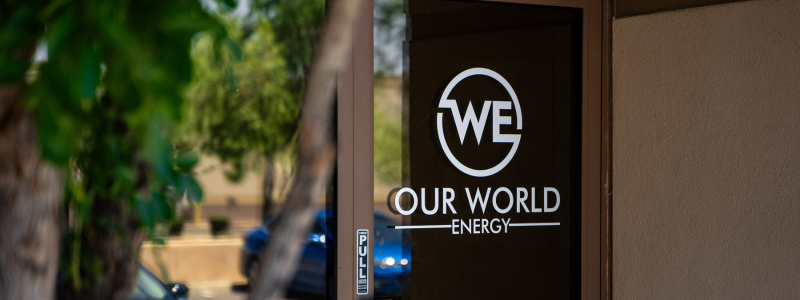Summer has come to an end, but we’re still experiencing hot days reaching the 90s across the Southwest region. Solar power appears to be an optimal energy solution in states abundant with sunshine, and it certainly is. However, it’s crucial to recognize that every state experiences its fair share of severe weather that potentially affects solar panels.
In this blog, we’ll answer the following questions about extreme weather conditions and solar panels:
- Do solar panels work in extreme weather?
- What is the maximum temperature a solar panel can withstand?
- Can too much sun damage solar panels?
- Can solar panels catch fire in extreme heat?
- Can solar panels withstand storms?
- Do solar panels get hit by lightning?
Do Solar Panels Work in Extreme Weather?

Solar panels are specifically designed to absorb sunlight and convert it into energy. Solar panels can operate effectively in cold weather because their functionality is reliant on harnessing sunlight rather than heat. That said, solar panel performance can vary depending on the weather.
Interestingly enough, heightened air temperature can actually cause a slight decrease in solar panel efficiency. Cool weather is the preferred climate for solar panel function. There may be concern about snow, rain, and ice blocking solar panels and reducing sun absorption, but thankfully, panels are installed at an angle, and snow or rain typically drains off.
Overall, solar panels are pretty durable and built to withstand extreme weather conditions, including hailstorms and intense heat. They aren’t foolproof, though; regular maintenance is vital to ensure no damage or shortages.
What is the Maximum Temperature a Solar Panel Can Withstand?
Solar panels can tolerate extreme temperatures, making them suitable for the intense summers in Southwestern states. They can reach temperatures over 100 degrees Fahrenheit and withstand up to 200 degrees Fahrenheit. Their resistance to high temperatures is convenient for summer days, but long-lasting heat waves can take a toll on solar panel efficiency and reduce energy savings.
Can Too Much Sun Damage Solar Panels?

It might sound ironic since solar panels depend on sunlight, but too much sun can cause harm. In prolonged, extreme heat, panels can overheat and lead to thermal stress, reducing long-term efficiency. Likewise, sweltering temperatures and exposure to UV rays can degrade the panels’ material.
To mitigate these risks, solar panel manufacturers use heat and UV-ray-resistant materials. A protective layer is also installed to shield the solar cells from direct sun exposure. Even with these precautions, solar panels will wear out over time, and without proper maintenance, the protective layers of the panels can crack and become permanently damaged.
Can Solar Panels Catch Fire in Extreme Heat?
Solar panels are innately designed to withstand heat while in the process of storing and converting sunlight to energy. It’s highly unlikely that a solar energy system will catch fire due to the maximum temperatures it can handle (up to 200 degrees Fahrenheit). That said, it’s important to schedule regular maintenance to monitor and repair any electrical wiring faults that could be a potential fire hazard.
Can Solar Panels Withstand Storms?

Yes, solar panels are designed to survive all types of storms, including snow, hail, and even hurricanes. Rain can actually have a positive effect on solar energy systems. It washes away dirt and dust residue, giving more access to sunlight. Solar panels are bolted down and tightly secured to a surface to be unmovable. Because of this, they’ll stand firm against wind speeds up to 140 miles per hour and category-three hurricanes.
Do Solar Panels Get Hit By Lightning?
Solar panels don’t attract lightning, and the probability of your solar energy system being struck is unlikely, but it’s still possible. In the event that your solar panels do get struck, the lightning bolts will melt the exterior of the panels and cause severe damage, even rendering them useless. Again, solar panels don’t increase the chances of your roof being hit by lightning, and the scenario is highly improbable.
There are different options available for added protection against lightning strikes. During solar panel installation, panel frames and mounts should be grounded as a method of redirecting lightning to the ground. You can also install Surge Protection Devices (SPDs) in multiple spots on your system to absorb and divert high-voltage lightning strikes. Before the installation process, talk to your solar installers to discuss these options and how to best protect your home.
Rely on The Professionals At Our World Energy for the Best in Sustainable Power

Our World Energy utilizes state-of-the-art solar technology to provide you and your household with top-tier renewable energy solutions. Trust our team to handle the installation and maintenance, ensuring your solar panels operate at peak efficiency throughout the year.
Reach out to us today to discover more about solar energy and take the first step toward a sustainable future!

